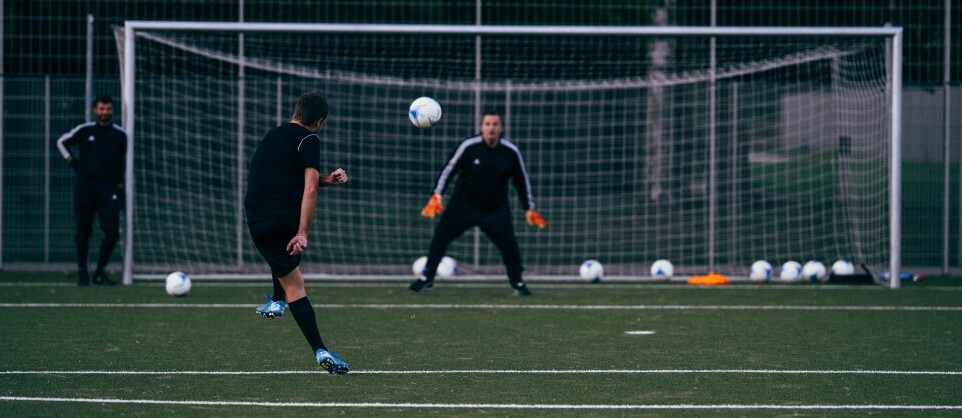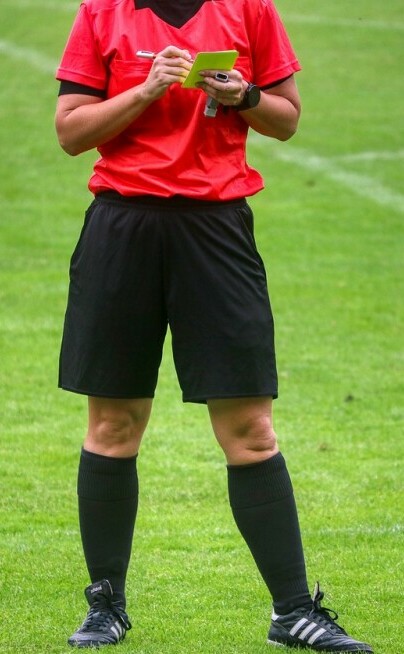I’m going to kick things off by laying out the groundwork on what exactly a penalty is in the realm of soccer.
It’s pretty straightforward: A penalty in soccer is essentially an infraction that’s committed when a player breaks the Laws of the Game during a match.
Now what is a big part of a referee’s job?
You guessed it.
They are the ones who spot these infractions and enforce the rules by signaling for a penalty.
There’s a key distinction in soccer penalties that you’ll find useful: direct and indirect free kicks.
A direct kick means you can shoot straight for goal if you’re feeling confident, while an indirect kick requires another player to touch the ball before you can say ‘goal’.
And this isn’t just about punishing foul play; it’s also about maintaining fairness and safety on the pitch.
Let me give you a bit of background on these rules. They are meticulously updated and preserved by the International Football Association Board (IFAB), the gatekeepers of soccer’s regulating laws.
Essentially, there are penal fouls, which involve physical contact and unsporting behavior, and non-penal fouls, which are generally less severe but still punishable offenses.
I’m here to help you get your head around these regulations so that you’ll not only appreciate the finesse of professional matches but also improve your own game.
Stay tuned, because next up, you’re going to find out about the most common soccer penalties and what they look like in action.
Most Common Soccer Penalties Explained
Imagine you’re watching a high-stakes soccer match. The energy is palpable, and every move could tip the scale.
I’m going to take you through the penalties that can shift the momentum in a blink. Most importantly, you’ll find out about how players end up in these situations and what they really mean for the game.
Tripping
Tripping or attempting to trip an opponent is a no-go. It’s one of the quickest ways to hear the referee’s whistle and see the opposing team awarded a free kick. This isn’t just about clumsiness; it reflects a lapse in judgement or technique.
Ball handling
If you’re not the goalie, keep your hands to yourself, because deliberate handballs will give away a free kick or even a penalty kick if it happens in the box. Sure, accidental handballs happen, but it’s the deliberate ones that cause trouble.
Rough Play
What about playing rough? Excessive force or reckless tackling can not only injure someone but it’s going to get you booked or sent off. This is where control and careful play come into the picture. It’s not about playing timidly, but playing smartly.
Offside
You’ve probably heard of the offside rule, right? Well, it’s misunderstood by many. Simply put, an attacking player cannot be closer to the opposing team’s goal line than the second-to-last opponent when the ball is played to them—unless certain conditions apply.
Delaying the Game
Delaying the game penalties are given when a player intentionally wastes time.
Dissent
Dissent penalties are given when a player argues with a referee’s decision.
Unsportsmanlike Contact
Unsportsmanlike conduct penalties are given when a player engages in behavior deemed unsportsmanlike, such as diving or feigning injury.
Illegal Substitution
Illegal substitution penalties are given when a team makes a substitution illegally, such as substituting a player who has not been properly cleared to enter the game.
Goalkeeper Violations
Goalkeeper violation penalties are given when the goalkeeper commits a foul, such as holding onto the ball for too long or handling the ball with their hands when it has been deliberately kicked to them by a teammate.
Professional Foul
Finally, there’s the infamous ‘professional foul.’ In my opinion, this is one of the sports world’s backhanded compliments.
It’s a deliberate foul to stop a promising attack, usually when there’s no other way to do so but it often results in a sending off and a suspension.
Understanding these penalties is critical—but avoiding them? That’s an art form, which leads us to our next topic: strategies to keep your name out of the referee’s book and your team at full strength.
Strategies to Avoid Committing Penalties
I’m going to share with you some tried-and-true strategies on how to keep yourself from hearing that dreaded whistle for your missteps.
First and foremost, it’s crucial to really get to grips with the Laws of the Game. They’re put together and maintained by the International Football Association Board (IFAB), and they’re not just guidelines; they’re the rules that govern everything on the pitch.
Now, you may think that playing soccer is all about instinct, but there’s a surprising amount of strategy involved.
Proper positioning can save you from making late tackles that result in penalties. It’s all about being in the right place at the right time.
This means drilling into your muscle memory where you should be on the field in relation to the ball and your opponents.
Another critical element is timing, especially when it comes to challenges. Mastering the timing of when to go for the ball and when to hold back can mean the difference between a clean tackle and giving away a foul.
Maybe less obvious is the focus you’ll need to maintain your composure. When players get frustrated or angry, they are more likely to commit fouls. So keeping a cool head is essential.
Don’t underestimate the significance of fair play and sportsmanship. Upholding a high standard of conduct on the field tends to reduce the number of infractions and enhances the overall spirit of the game.
Additionally, it’s helpful to use your voice on the field. Effective communication with your teammates can prevent a multitude of mistakes, including those that lead to penalties.
You can always adjust your approach down the road. That’s the beauty of the game—it’s constantly evolving, and so are you.
Embrace these strategies, and you’ll likely find yourself staying on the referee’s good side and contributing more positively to your team’s success.
Consequences of Penalties and Their Impact on the Game
Penalties don’t just disrupt a game in the moment; they can have a ripple effect that influences far more than the immediate play.
When penalties are called, they not only affect the direct outcome of the match but can also have an emotional and psychological impact on the players and the team as a whole.
Here’s what happens after the whistle blows.
In the short term, penalties can shift the momentum of the game. A direct free-kick or penalty kick awarded to the opposing team in a critical moment can be the difference between a win, a draw, or a loss.
This can shape the entire match, affecting coach strategies, player morale, and audience engagement.
Long-term effects include disciplinary measures like Yellow Cards and Red Cards leading to player suspensions.
Consistent penalty accumulation can result in a player or even a team earning a reputation that precedes them, which could influence referee decisions in future games. This is why it’s critical for players to not only play by the rules but to also be perceived as playing fair.
Penalties have the power to make or break careers, as seen in various case studies that recount pivotal moments in soccer history.
They can be the subject of analysis and conversation for years to come, especially when they occur during major tournaments or crucial league matches.
Understanding and recovering from penalties is just as important as avoiding them. It’s essential for players to review their mistakes, learn the appropriate lessons, and not let one penalty define their career.
Everyone makes mistakes, but the key is to make them stepping stones to becoming a better player.
Take away
In conclusion, penalties in soccer are more than just momentary setbacks. They have consequences that can extend far beyond the game at hand.
While it’s critical to avoid them, it’s equally important to understand their repercussions and learn from any that do occur.
This builds not only better individual players but also stronger, more cohesive teams.
I would love to hear your feelings, thoughts and experience on this topic. Lets engage in the comment section below.
Happy soccer season.




I don’t know if this site is the best use for coaches, but it is certainly the best for grandmothers. My ten year old grandson is soccer mad, and I have never watched a soccer game in my life (even though I come from a country it is called football and is very popular). At least now I can listen to him chatter and have some idea of what he is talking about, even if my eyes glaze over with boredom. Thank you for writing this, and now I know where penalties are so talked about, they van pivot the result of a game in one kick. What a lot of pressure for a player.
Hahaha that’s a good one Catherine. I already like your grandson. He is my kind of a football fan.
I agree with you about how annoying it is to have a family member so crazy about a sport that you don’t have a clue about.
I was like that when my young brother was head over hills with cricket. But now I grew to love it. Other than soccer, I am building another website on cricket.
Thank you for your kind comment and give my best regards to your grandson.
.